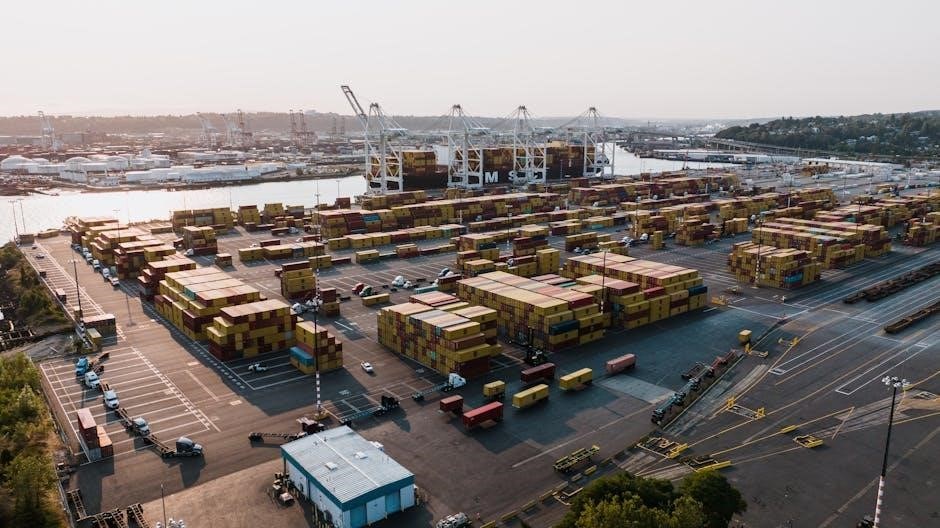A Commercial Driver’s License (CDL) in Washington State is essential for operating commercial vehicles, ensuring safety and compliance with state regulations. The Washington CDL Manual provides detailed guidance for applicants, covering license requirements, testing procedures, and safe driving practices. This resource is crucial for understanding the rules and responsibilities of commercial drivers in the state, helping to maintain road safety and efficiency.
1.1 Overview of CDL Requirements
Obtaining a Commercial Driver’s License (CDL) in Washington State requires meeting specific criteria outlined in the Washington CDL Manual. Applicants must pass knowledge and skills tests, hold a valid medical certificate, and provide necessary documentation. The process involves obtaining a Commercial Learner’s Permit (CLP) and completing a skills test. The official manual serves as a comprehensive guide, ensuring applicants understand state and federal regulations for safe and legal commercial driving.
1.2 Importance of CDL for Commercial Drivers
A Commercial Driver’s License (CDL) is crucial for operating commercial vehicles legally and safely in Washington State. It ensures drivers meet federal and state safety standards, making roads safer for everyone. Employers require a CDL to hire drivers, as it verifies professional competence. The license also promotes compliance with traffic laws and regulations, maintaining public trust in commercial transportation. It is essential for upholding legal and professional driving standards.

CDL Requirements and Eligibility
A Commercial Driver’s License (CDL) is required for operating commercial vehicles in Washington State. Eligibility includes meeting age requirements, providing residency and documentation proof, and passing medical exams.
2.1 Age Requirements
In Washington State, applicants for a Commercial Driver’s License (CDL) must be at least 21 years old to operate commercial vehicles across state lines. For intrastate commerce, the minimum age is 18. Applicants under 21 cannot transport hazardous materials or operate vehicles requiring a hazardous materials endorsement. Meeting the age requirement is a critical step in the CDL application process, as specified in the Washington CDL Manual.
2.2 Residency and Documentation
To apply for a CDL in Washington State, applicants must provide proof of residency and valid identification. Documents such as a state ID, Social Security card, and proof of residency (e.g., utility bills or lease agreements) are required. The Department of Licensing (DOL) verifies these documents to ensure eligibility. Proper documentation is essential to complete the CDL application process, as outlined in the Commercial Driver Guide and available at DOL offices.

The CDL Application Process
The CDL application process in Washington State involves completing eligibility requirements, obtaining a Commercial Learner’s Permit (CLP), and passing the required knowledge and skills tests.
3.1 Obtaining a Commercial Learner’s Permit (CLP)
To obtain a Commercial Learner’s Permit (CLP) in Washington State, applicants must pass the required knowledge tests at a driver licensing office. The tests cover essential topics such as traffic laws, safe driving practices, and knowledge specific to the type of commercial vehicle you intend to operate. After passing, you will receive a CLP, which is valid for 180 days and allows you to practice driving under the supervision of a licensed CDL holder. This step is crucial before advancing to the CDL skills test.
3.2 CDL Application Fees and Required Documents
Applicants for a Commercial Driver’s License (CDL) in Washington State must submit the required fees and documentation. The fees vary based on the type of CDL and endorsements. Required documents include proof of identity, residency, and a valid Medical Examiner’s Certificate. Additional fees may apply for endorsements or restrictions. For detailed information, refer to the Washington CDL Manual or visit a driver licensing office. Proper documentation ensures a smooth application process.

CDL Testing and Exams
The CDL testing process in Washington State includes both knowledge and skills exams, ensuring drivers meet federal and state safety standards. The official Washington CDL Manual is a critical resource for preparation.
4.1 Knowledge Tests for CDL
The CDL knowledge tests in Washington State assess a driver’s understanding of safety regulations, traffic laws, and vehicle operation. The tests are based on the Washington CDL Manual, covering topics like driving techniques, cargo management, and emergency procedures. Passing these tests is mandatory to obtain a Commercial Learner’s Permit (CLP), which is required before taking the skills test.
4.2 Skills Tests for CDL
The CDL skills test in Washington State evaluates a driver’s ability to operate a commercial vehicle safely. It includes three parts: a pre-trip inspection, basic vehicle control exercises, and an on-road driving test. Applicants must hold a Commercial Learner’s Permit (CLP) for at least 14 days before taking the skills test. Proper preparation using the Washington CDL Manual is essential to ensure readiness for these assessments.
4.3 The Role of the Official Washington CDL Manual
The official Washington CDL Manual serves as a comprehensive guide for commercial driver’s license applicants. It covers essential topics such as safe driving practices, vehicle inspection procedures, and state-specific regulations. The manual is a critical resource for preparing for both the knowledge and skills tests, ensuring applicants are well-informed and ready to meet Washington State’s CDL requirements effectively.

Medical Standards for Commercial Drivers
Commercial drivers must meet strict medical standards to ensure road safety. A Medical Examiner’s Certificate (MEC) is required, issued by certified examiners. Common disqualifying conditions include vision or hearing impairments, diabetes, and heart issues. Regular medical exams are crucial to maintain CDL licensure and operational safety.
5.1 Medical Examiner’s Certificate (MEC)
A Medical Examiner’s Certificate (MEC) is required for all commercial drivers in Washington State. Conducted by a certified medical examiner, the exam ensures drivers meet federal health standards. The MEC must be renewed periodically, depending on health conditions. Drivers must carry a copy of the MEC with their CDL to verify medical fitness for duty. This certification is crucial for maintaining legal driving privileges and operational safety.
5.2 Disqualifying Medical Conditions
Certain medical conditions can disqualify individuals from obtaining or maintaining a CDL in Washington State. These include severe vision loss, epilepsy, diabetes requiring insulin, and heart conditions like coronary artery disease. Drivers must meet strict health standards to ensure public safety. A Medical Examiner’s Certificate (MEC) is required to confirm fitness for duty. Failure to meet these standards can result in license suspension or denial. Regular medical evaluations are mandatory to maintain certification;

CDL Endorsements and Restrictions
CDL endorsements in Washington State allow drivers to operate specialized vehicles, such as those carrying hazardous materials or passengers. Restrictions limit driving privileges based on qualifications and vehicle type.
6.1 Types of Endorsements Available
Washington State offers various CDL endorsements, including Hazmat for transporting hazardous materials, Passenger for carrying passengers, and Tanker for operating tank vehicles. Additional endorsements like Doubles/Triples and Motorcycle are also available, allowing drivers to expand their career opportunities by qualifying for specialized roles. Each endorsement requires specific testing and training to ensure driver proficiency and public safety.
6.2 Understanding Restrictions on CDL
CDL restrictions in Washington State are designed to ensure safety and compliance. Common restrictions include air brake restrictions for drivers without proper endorsement and passenger vehicle restrictions for non-passenger-licensed drivers. Additional restrictions may apply to tankers or hazmat operations. Understanding these limitations is crucial for maintaining legal driving privileges and ensuring public safety on the road. Restrictions are clearly outlined in the Washington CDL Manual for applicant reference.

Washington State-Specific CDL Regulations
Washington State enforces specific CDL regulations to ensure road safety and compliance. The Department of Licensing oversees these rules, including REAL ID requirements and fleet safety standards. These regulations align with federal guidelines while addressing state-specific needs, ensuring commercial drivers operate safely and efficiently within Washington borders.
7.1 State CDL Laws and Regulations
Washington State’s CDL laws are designed to ensure public safety and compliance with federal standards. The Department of Licensing (DOL) enforces these regulations, which include specific requirements for driver qualifications, vehicle inspections, and hours of service. Applicants must meet rigorous standards, including medical certifications and skills testing, to obtain and maintain a valid CDL. These laws help safeguard road users and maintain efficient commercial transportation networks across the state.
7.2 Washington State Fleet Safety Requirements
Washington State enforces strict fleet safety requirements to ensure commercial vehicles operate safely. These include regular vehicle inspections, driver medical certifications, and adherence to hours-of-service rules. Employers must maintain detailed records of driver qualifications and training. The state also promotes safe driving practices through educational programs and enforcement of traffic laws, ensuring fleets comply with both state and federal safety standards to reduce accidents and protect public safety.

Maintaining and Renewing Your CDL
To maintain your CDL in Washington State, submit medical certifications to the CDL Medical Unit and keep your license record updated. Renewal requires completing the application process and paying fees before expiration to ensure uninterrupted commercial driving privileges.
8.1 CDL Renewal Process
To renew your CDL in Washington State, visit a driver licensing office, submit the required documents, and pay the renewal fee. Ensure your Medical Examiner’s Certificate is up to date. You can also check the status of your renewal online or by contacting the Washington State Department of Licensing (DOL). Renewal must be completed before the expiration date to maintain valid commercial driving privileges.
8.2 Keeping Your CDL Record Up to Date
To maintain an accurate CDL record, submit updates to the Washington State Department of Licensing (DOL) promptly. This includes changes in address, medical status, or employment. Ensure your Medical Examiner’s Certificate is current and on file. Regularly review your driving record for accuracy and update your information through DOL offices or online services to comply with state and federal regulations.

Resources for CDL Applicants
The official Washington CDL Manual is a key resource for applicants. Visit DOL offices or access online guides and study materials for comprehensive preparation.
9.1 Washington State Department of Licensing (DOL) Offices
Washington State Department of Licensing (DOL) offices provide essential services for CDL applicants. Visit in person to obtain forms, submit documents, or get printed copies of the CDL guide. Offices are equipped to handle licensing needs, ensuring compliance with state and federal regulations. For those unable to visit, services are also accessible by mail, email, or fax, offering convenience and efficiency.
9.2 Online Guides and Study Materials

Online guides and study materials are indispensable for CDL preparation in Washington State. The official Washington CDL Manual is available digitally, offering detailed insights into state-specific laws, driving techniques, and testing requirements. Additionally, audio versions of the manual and interactive study guides provide flexible learning options. These resources ensure applicants are well-prepared for knowledge and skills tests, helping them achieve CDL certification efficiently.

